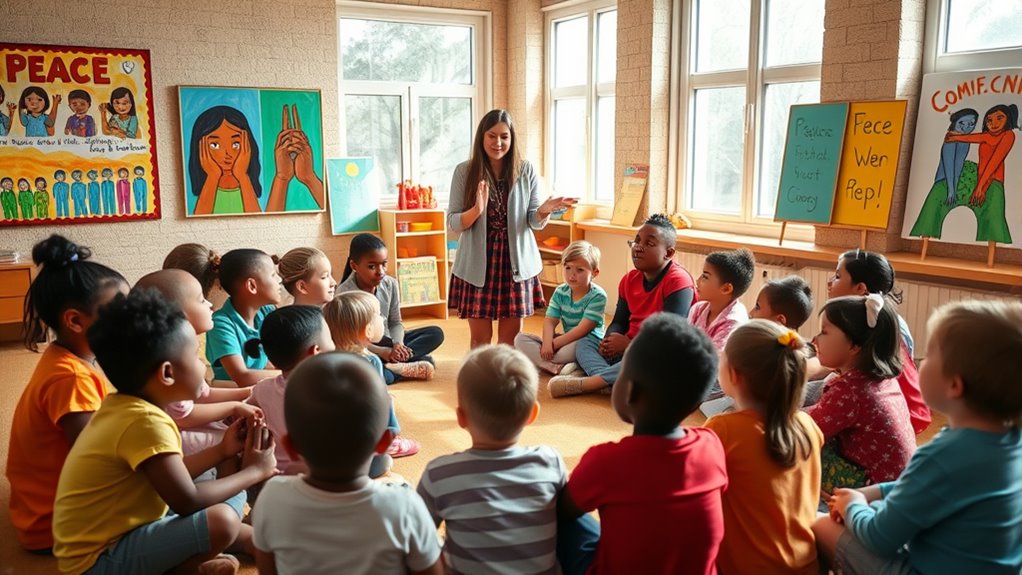To teach kids about social justice through faith and compassion, share stories that highlight diverse experiences and emphasize kindness and empathy. Connect religious teachings on love and justice to real-world issues, encouraging active involvement in community service and advocacy. Demonstrate compassionate actions yourself and involve children in practical efforts to help others. By linking faith to everyday acts of care, you’ll nurture a strong moral foundation—keep exploring ways to inspire their compassionate activism.
Key Takeaways
- Use stories and media to help children empathize with diverse experiences and understand social issues through emotional connection.
- Connect faith-based teachings on love, justice, and compassion to real-world activism and community service.
- Incorporate religious scriptures and principles into daily discussions to motivate active involvement in social justice efforts.
- Teach cybersecurity as a form of community care, emphasizing protecting others’ online safety as part of social responsibility.
- Model compassionate behaviors and involve children in service projects to foster practical faith-based activism and empathy.

Have you ever wondered how to introduce your kids to the important concepts of social justice? It’s a question many parents ask as they want their children to grow up with a sense of compassion and a desire to make a difference. The key lies in nurturing children’s empathy and showing them how faith-based activism can inspire action rooted in love and justice. When you help your kids understand others’ feelings and experiences, you’re planting the seeds for a lifelong commitment to fairness and kindness.
Start by engaging your children in conversations about empathy. Share stories that highlight the struggles and triumphs of people from different backgrounds. Use books, movies, or news stories that showcase acts of kindness or highlight social issues. When your kids see the human side of these stories, their empathy naturally deepens. Encourage them to imagine how they would feel in someone else’s situation, fostering an emotional connection that motivates caring actions. This empathy becomes the foundation for understanding why social justice matters.
Engage kids with stories that reveal others’ struggles to nurture empathy and inspire social justice.
Faith-based activism offers a powerful framework for teaching kids about social justice. Many religious teachings emphasize love, compassion, and justice for all. As a parent, you can connect these principles to real-world issues by showing your children how faith can inspire activism. Attend community service projects or volunteer together at local charities. Explain that many faith traditions call believers to serve others and stand against injustice. When children see faith as a catalyst for positive change, they learn that their beliefs can be a force for good.
Incorporate faith-based stories and teachings into everyday life. Use passages from scriptures or religious texts that emphasize caring for others, standing up for the oppressed, or loving one’s neighbor. Discuss how these teachings relate to current social issues like poverty, discrimination, or environmental justice. Reinforce that faith isn’t just about personal belief but also about actively working to create a more just world. When children see their faith as a guide for activism, they become more motivated to participate in acts of service and advocacy.
Additionally, understanding the importance of cybersecurity can help parents teach kids about protecting themselves online, reinforcing the concept that safeguarding others’ information is part of caring for community. Encouraging children’s empathy and tying it to faith-based activism helps them understand that social justice isn’t just a distant idea; it’s a practical, heartfelt pursuit. By modeling compassionate behavior yourself, sharing stories, and involving them in community efforts, you give your kids the tools to become empathetic, activist-minded individuals. They’ll learn that caring for others and standing up for justice are not only moral choices but also expressions of their faith and love for humanity.
Frequently Asked Questions
How Can I Start Conversations About Social Justice With Young Children?
You can start conversations about social justice with young children by talking about fairness and exploring kindness in everyday situations. Use simple stories or real-life examples to discuss how everyone deserves respect and compassion. Ask open-ended questions to encourage their thoughts, and model kind behavior yourself. By making these discussions age-appropriate and relating them to their experiences, you help children understand social justice naturally and compassionately.
What Are Age-Appropriate Ways to Discuss Faith and Social Justice?
You can introduce faith and social justice through age-appropriate activities and faith-based stories that resonate with young children. Use simple stories from your faith tradition that highlight compassion, kindness, and justice. Incorporate interactive activities like role-playing or art projects to help them understand these concepts practically. Keep discussions short, positive, and relatable, ensuring they feel safe and inspired to embody these values in their daily lives.
How Do I Address Conflicting Beliefs Within My Family?
When addressing conflicting beliefs within your family, foster open family dialogue by encouraging everyone to share their perspectives respectfully. Focus on finding common ground and aligning your values through honest conversations. Show empathy and listen actively, which helps build understanding. By emphasizing shared values and maintaining respectful communication, you create a supportive environment where differing beliefs can coexist peacefully, strengthening your family bond and guiding your children through complex social justice topics.
What Resources Are Best for Teaching Kids About Social Justice and Faith?
You should explore faith-based activities and social justice books designed for children. These resources help teach empathy, compassion, and justice aligned with your faith. Look for books that present real stories and faith-inspired lessons, and engage your kids in activities like service projects or prayer groups focused on social issues. These tools foster understanding and compassion while reinforcing your values, making social justice a natural part of their spiritual growth.
How Can I Model Compassionate Behavior Effectively at Home?
Think of yourself as a lighthouse guiding your child through life’s storms. You can model compassionate behavior by actively demonstrating kindness and empathy in everyday moments—whether it’s sharing chores, listening patiently, or standing up for others. When you show genuine concern and understanding, you create a ripple effect of compassion that your child will naturally follow, learning that kindness is a powerful way to make the world brighter.
Conclusion
By teaching kids about social justice, you’re helping them become compassionate, informed changemakers—think of it as their own personal “Rosetta Stone” for understanding the world. Remember, just like Galileo challenged old views, you can inspire young minds to see beyond the status quo. When you blend faith and compassion, you’re guiding them to stand up for justice in a way that’s truly timeless. Together, you’re shaping a future where kindness and fairness reign.










